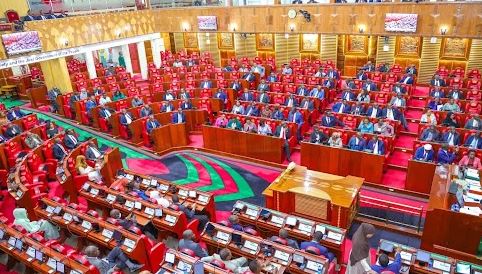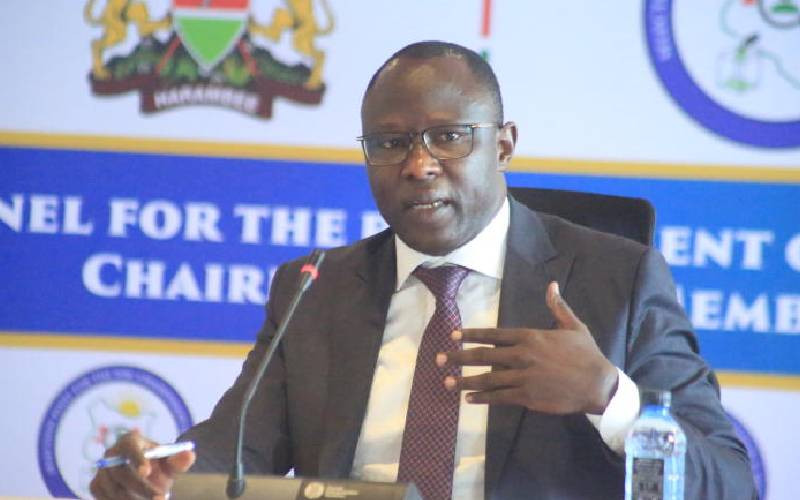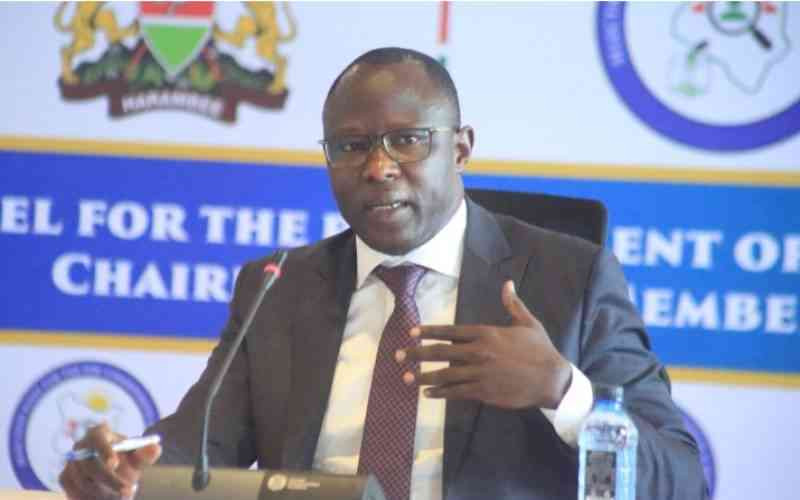Parliament Review: IEBC nominees set for vetting amid heightened public scrutiny

President William Ruto’s seven nominees to the Independent Electoral and Boundaries Commission (IEBC) are preparing to face rigorous vetting in Parliament as the country moves closer to restoring leadership at the critical electoral body.
Following the President’s formal submission of the names to the National Assembly, Speaker Moses Wetang’ula referred the list and accompanying curricula vitae to the Departmental Committee on Justice and Legal Affairs.
The committee will conduct public vetting sessions beginning May 26, 2025, at 9:30 a.m. in the Mini Chamber, First Floor, County Hall, Parliament Buildings.
The lineup of nominees includes Erastus Edung Ethekon, who is slated for the position of Chairperson. The other nominees for the role of commissioners are Ann Njeri Nderitu, Moses Alutalala Mukhwana, Mary Karen Sorobit, Hassan Noor Hassan, Francis Odhiambo Aduol, and Fahima Arafat Abdalla.
These appointments are meant to fill longstanding vacancies at the IEBC, the constitutional body charged with overseeing elections, delimiting constituency boundaries, and ensuring the integrity of Kenya’s democratic processes.
In compliance with Article 118(1)(b) of the Constitution and Section 6(4) of the Public Appointments (Parliamentary Approval) Act, the public has been invited to participate in the process. Clerk of the National Assembly S. Njoroge has called on citizens to submit affidavits contesting the nominees’ suitability, along with any supporting documentation.
“The committee encourages Kenyans to exercise their constitutional right by submitting written statements under oath regarding any reservations or concerns they may have,” read a notice issued earlier this week.
Observers anticipate that the approval hearings could become a politically charged process, given the IEBC's central role in shaping electoral credibility. The incoming team will inherit a docket weighed down by public expectations for impartiality, transparency, and reform following the turbulence surrounding previous election cycles.
If approved by Parliament, the seven nominees will be sworn into office to steer the commission in the run-up to future electoral activities, including boundary reviews and preparations for the 2027 General Election.
The public has until May 23, 2025, to submit their written representations.
Meanwhile, the ministry of Roads and Transport has outlined a transformative roadmap for the nation’s transport sector, anchored in sustainability, technological innovation, and regional integration, as part of a major policy shift designed to modernise infrastructure and reduce public sector burdens.
In a detailed briefing before the Senate Standing Committee on Roads, Cabinet Secretary for Roads and Transport Davis Chirchir laid out the ministry’s strategic direction, showcasing a portfolio of landmark initiatives and a newly restructured framework that includes the establishment of the State Department for Aviation and Aerospace Development.
“The Ministry is mandated to formulate road and transport policies, develop legal and regulatory frameworks, and provide oversight on service delivery by all State Corporations under its purview,” CS Chirchir told senators.
At the heart of the ministry’s agenda is the National Electric Mobility Policy, already approved by the Cabinet. The policy aims to drive the uptake of electric vehicles (EVs), positioning Kenya as a leader in sustainable transport in the region.
“Electric mobility has obtained executive approval to make the policy operational, but the Traffic Act must be updated to accommodate emerging technologies,” Chirchir noted.
With urban centers facing rapid growth and mounting congestion, the Ministry is also advancing a National Urban Transport Policy. This seeks to improve urban mobility, integrate various modes of transport, and reduce environmental impact through better planning and regulation.
“This policy aligns with climate action commitments while addressing the realities of urbanization. We are focused on creating efficient, people-centered mobility systems,” said Chirchir.
The committee praised the Ministry’s direction but called for clear timelines, transparency in implementation, and inclusive stakeholder engagement to ensure the ambitious reforms benefit all Kenyans.
In another meeting in Mombasa, the urgent need to make legislative records more accessible to the public dominated the opening of the 7th Annual Conference of the Hansard Association of Kenya (HAK), which kicked off with a strong call to overcome language barriers in parliamentary reporting.
In her keynote address, Serah Kioko, Deputy Clerk of the National Assembly, emphasised the critical role of language in bridging the gap between Parliament and the public.
She called on Hansard professionals to prioritize the translation of official records into local languages to foster inclusive governance and informed citizen participation.
“We must not shy away from the linguistic questions that continue to challenge our work,” Mrs. Kioko said during her opening remarks and in a subsequent presentation titled “The Power of Language in the Hansard.” “If we want real public participation, people must be able to understand what their representatives are saying in Parliament.”
The week-long conference, attended by parliamentary reporters, language experts, and legislative officers from across the country, aimed to reimagine how the Hansard — the official verbatim record of parliamentary proceedings — can better serve a diverse and multilingual population.











